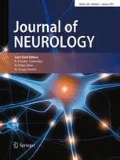Abstract
Patients with functional motor disorder (FMD) are commonly seen by physiotherapists and there is growing evidence to support a physical rehabilitation approach. There are, however, few descriptions in the literature of the content of successful physiotherapy treatment. This prospective cohort study reports the practicalities and outcomes of a pilot 5-day physiotherapy programme. Patients were referred from a specialist movement disorders clinic. The treatment consisted of education and movement retraining, with a long-term self-management focus. Education and movement retraining was based on a pathophysiological model for FMD that stresses the importance of self-focussed attention and illness belief. Patients were assessed at baseline, end of treatment and 3-month follow-up. 47 patients completed the programme, mean symptom duration was 5.5 years, 64 % were unemployed due to ill health. At the end of treatment, 65 % rated their symptoms as “very much improved” or “much improved”, this reduced to 55 % at 3 months. At follow-up, there was a significant improvement in physical domains of the SF-36, Berg Balance Scale and 10 Metre Timed Walk. Measures of mental health did not change. This prospective cohort study adds to the growing evidence that supports the use of specialist physiotherapy treatment for FMD. Improvements here were made despite the cohort having characteristics associated with poor prognosis. We argue that specific treatment techniques are important and have the potential to improve physical function, quality of life and may prove to be a cost-effective treatment for selected patients with FMD.


Similar content being viewed by others
References
Edwards MJ, Bhatia KP (2012) Functional (psychogenic) movement disorders: merging mind and brain. Lancet Neurol 11:250–260
American Psychiatric Association (2013) Diagnostic and statistical manual of mental disorders: DSM 5, vol, 5th edn. American Psychiatric Publishing, Washington, DC
Edwards MJ, Stone J, Nielsen G (2012) Physiotherapists and patients with functional (psychogenic) motor symptoms: a survey of attitudes and interest. J Neurol Neurosurg Psychiatry 83:655–658
Nielsen G, Stone J, Edwards MJ (2013) Physiotherapy for functional (psychogenic) motor symptoms: a systematic review. J Psychosom Res 75:93–102
Czarnecki K, Thompson JM, Seime R, Geda YE, Duffy JR, Ahlskog JE (2012) Functional movement disorders: successful treatment with a physical therapy rehabilitation protocol. Parkinsonism Relat Disord 18:247–251
Jordbru AA, Smedstad LM, Klungsøyr O, Martinsen EW (2014) Psychogenic gait disorder: a randomized controlled trial of physical rehabilitation with one-year follow-up. J Rehabil Med 46:181–187
Demartini B, Batla A, Petrochilos P, Fisher L, Edwards MJ, Joyce E (2014) Multidisciplinary treatment for functional neurological symptoms: a prospective study. J Neurol 261:2370–2377
Fahn S, Williams DT (1988) Psychogenic dystonia. Adv Neurol 50:431–455
Gupta A, Lang AE (2009) Psychogenic movement disorders. Curr Opin Neurol 22:430–436
Edwards MJ, Adams RA, Brown H, Parees I, Friston KJ (2012) A Bayesian account of ‘hysteria’. Brain 135:3495–3512
Edwards MJ, Fotopoulou A, Parees I (2013) Neurobiology of functional (psychogenic) movement disorders. Curr Opin Neurol 26:442–447
Butler DS, Moseley GL (2003) Explain Pain. Noigroup Publications, Adelaide
Nielsen G, Stone J, Matthews A, Brown M, Sparkes C, Farmer R, Masterton L, Duncan L, Winters A, Daniell L, Lumsden C, Carson A, David AS, Edwards M (2014) Physiotherapy for functional motor disorder: a consensus recommendation. J Neurol Neurosurg Psychiatry (In press)
Brazier JE, Harper R, Jones NMB, O’Cathain A, Thomas KJ, Usherwood T, Westlake L (1992) Validating the SF-36 health survey questionnaire: new outcome measure for primary care. BMJ 305:160–164
Herdman M, Gudex C, Lloyd A, Janssen M, Kind P, Parkin D, Bonsel G, Badia X (2011) Development and preliminary testing of the new five-level version of EQ-5D (EQ-5D-5L). Qual Life Res 20:1727–1736
Zigmond AS, Snaith RP (1983) The hospital anxiety and depression scale. Acta Psychiatr Scand 67:361–370
Zahra D, Qureshi A, Henley W, Taylor R, Quinn C, Pooler J, Hardy G, Newbold A, Byng R (2014) The work and social adjustment scale: reliability, sensitivity and value. Int J Psychiatry Clin Pract 18:131–138
Tyson SF, Connell LA (2009) How to measure balance in clinical practice. A systematic review of the psychometrics and clinical utility of measures of balance activity for neurological conditions. Clin Rehabil 23:824–840
Tyson S, Connell L (2009) The psychometric properties and clinical utility of measures of walking and mobility in neurological conditions: a systematic review. Clin Rehabil 23:1018–1033
Sharpe M, Stone J, Hibberd C, Warlow C, Duncan R, Coleman R, Roberts R, Cull R, Pelosi A, Cavanagh J, Matthews K, Goldbeck R, Smyth R, Walker A, Walker J, MacMahon A, Murray G, Carson A (2010) Neurology out-patients with symptoms unexplained by disease: illness beliefs and financial benefits predict 1-year outcome. Psychol Med 40:689–698
Gelauff J, Stone J, Edwards M, Carson A (2014) The prognosis of functional (psychogenic) motor symptoms: a systematic review. J Neurol Neurosurg Psychiatry 85:220–226
Appleby J, Devlin N, Parkin D (2007) NICE’s cost effectiveness threshold. BMJ 335:358–359
Kranick S, Ekanayake V, Martinez V, Ameli R, Hallett M, Voon V (2011) Psychopathology and psychogenic movement disorders. Mov Disord 26:1844–1850
Acknowledgments
GN is funded by an NIHR/HEE Clinical Doctoral Research Fellowship. MJE is supported by an NIHR Clinician Scientist Grant and by the UCL/UCLH Biomedical Research Centre.
Conflicts of interest
The authors declare that they have no conflict of interest.
Ethical standard
This study was part of a service evaluation project and therefore did not require ethics committee approval.
Author information
Authors and Affiliations
Corresponding author
Rights and permissions
About this article
Cite this article
Nielsen, G., Ricciardi, L., Demartini, B. et al. Outcomes of a 5-day physiotherapy programme for functional (psychogenic) motor disorders. J Neurol 262, 674–681 (2015). https://doi.org/10.1007/s00415-014-7631-1
Received:
Revised:
Accepted:
Published:
Issue Date:
DOI: https://doi.org/10.1007/s00415-014-7631-1



